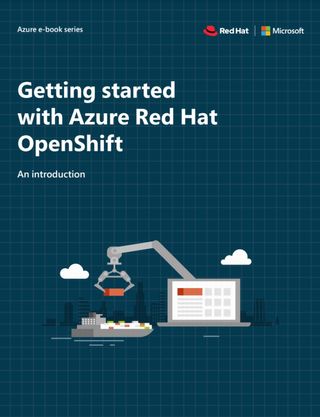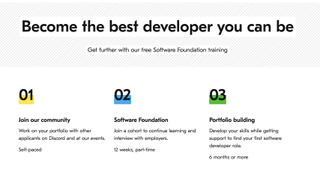The best free coding courses in the UK
A list of some of the best free coding courses in the UK to kickstart your career in software development and programming

Taking advantage of some of the best free coding courses in the UK offers a great opportunity to switch careers or fine-tune your skills.
Coding is recognized as one of the most useful skills to have in the modern workplace. There are a vast number of roles, across a wide variety of industries, that are now looking for candidates with coding experience, either as a core requirement of the job, or as a means of automating tasks to alleviate the day-to-day grind.
Organizations globally are in desperate need of tech talent amid growing skills gaps, so there’s no shortage of opportunities for aspiring programmers and developers.

Getting started with Azure Red Hat OpenShift
A developer’s guide to improving application building and deployment capabilities
Coding full-time can be a lucrative career choice with a high ceiling for growth. The average software developer salary stands at around £45,000 in the UK, with even entry level positions hitting the national average of £35,000.
What's more, reskilling into programming needn't break the bank. There are plenty of free courses available that cater to a variety of skillsets or experiences levels, you just need to know where to look. Handily, below we've provided a list of what we think are the best free coding courses in the UK right now.
The best free coding courses in the UK
FreeCodeCamp
Website: https://www.freecodecamp.org/
FreeCodeCamp is a charitable organisation that features a learning platform with tutorials and verified certifications. Every part of the website is completely free.
Users learn to code by finishing coding challenges and building projects. There are currently over 6,000 tutorials on offer to potential students, and with no set schedule, students can work through tutorials and projects in their own time.
Certifications include responsive web design, JavaScript, Data visualisation, APIs and microservices, and information security and quality assurance.
Code First Girls
Website: https://www.codefirstgirls.org.uk/
A particular favorite of ours, this coding website is aimed at women and was founded by Alice Bentinck and Matt Clifford. The charity provides free, part-time coding courses and so far has taught thousands of women around the UK for free.
Its free coding kick-starter courses are designed to fit in around full-time studies and delivered at over 50 locations in the UK.
Among these courses are introductions to web development, python programming, data science and SQL programming.
Code Your Future
Website: https://codeyourfuture.io/
Launched in 2016, this charity supports refugees and disadvantaged individuals to become developers. At present, the charity runs classes in a host of UK cities, including Manchester, London, Glasgow, and Birmingham.
There is also a class being run in Rome, Italy. The organisation teaches skills in HTML and CSS, JavaScript, Node.js, and React as well as non-technical skills.
Students may also be eligible for financial support to cover costs including Wi-Fi, transportation, childcare, and lunch in certain circumstances, following the completion of an initial introduction to coding course. A second, much more substantial course also covers full-stack web development.
Codecademy
Website: https://www.codecademy.com/
One of the mainstays of the free coding education space, Codecademy started in 2011 and has supported over 25 million people to learn programming skills.
Codecademy offers a free ‘basic’ package that teaches you basic coding skills to get your started, and allows students to learn at their own pace.
It’s notably hands-on with users expected to build websites and apps to learn skills. The courses are wide-ranging and cover (but are not limited to) HTML, CSS, JavaScript Rails, Ruby, jQuery, PHP, Python, and SQL.
If you can stretch your budget even slightly, there are paid courses through the ‘Plus’ and ‘Pro’ options, which are priced at £27.99 p/m and £49.99 p/m. It’s possible to cut costs down significantly on both these options by choosing a one-off annual payment.
Coursera
Website: https://www.coursera.org/
This is another large platform offering free coding courses, with curriculums put together by universities and companies in the industry. It doesn’t just provide the basic skills in coding, such as HTML, CSS, and so on; it goes way beyond this, with a huge range of topics on offer outside of programming and tech skills.
Unlike many other tools, Coursera is tutor-led, but while the courses are free, to gain an accredited qualification, or “Coursera Verified Certificate”, you’ll need to stump up some cash (anywhere in the region of $30 upwards).
Founders & Coders

Website: https://www.foundersandcoders.com/
This UK-based charity develops and runs tuition-free, peer-led training programmes in full-stack web development. It’s a unique way to learn to code with a focus on getting a job that uses these skills.
It runs 12-week long foundational courses to teach you the basics of software development - which can be done part-time. It also offers longer courses up to 21-months in length that provide a comprehensive dive into the world of software.
Profits made from graduate placement are fed back into funding the training process. In addition, students are expected to spend one to two evenings a month mentoring prospective applications. Graduates of the course spend at least one full week volunteering as a mentor during the first eight weeks of the following cohort.
Microsoft Learn
Website: https://docs.microsoft.com/en-us/learn/
If you want to focus your studies on Microsoft products, then the company has its own learning platform. Formerly known as Microsoft Virtual Academy, Microsoft Learn courses cover Microsoft Azure, Microsoft 365, Power BI, and SQL Server to name a mere few.
Whereas Virtual Academy was composed of recorded training videos structured around learning paths for specific topic areas, the new platform is constructed of learning plans with written content and hands-on labs. Each Learning Path comprises multiple modules, which are made up of multiple units.
Students who complete their course will earn a Microsoft Certified qualification, which are widely acknowledged and handy to have on a CV.
W3Schools
Website: https://www.w3schools.com/
This website is for anyone wanting to learn more about HTML, CSS, JavaScript, PHP, SQL, jQuery, AngularJS, XML and Bootstrap. Instead of guided learning, W3Schools gives students all the information about the elements of computer languages.
You can learn about languages by simply reading about them, or using an online editor, which allows you to edit examples and run code in a sandbox to see how things work. While the learning resources are free, to get a formal qualification, W3Schools also offers a paid-for test.
Code.org
Website: https://code.org/
This is another charity dedicated to encouraging people (especially schoolchildren and students) to learn how to code. There are introductory tutorials, about an hour-long, that cover hundreds of activities in over 45 languages.
The organisation’s primary goal is to teach children, so the courses are designed with this in mind, but if you’re looking for a course that definitely won’t assume any prior knowledge or experience, then this could be a good fit.
Get the ITPro. daily newsletter
Receive our latest news, industry updates, featured resources and more. Sign up today to receive our FREE report on AI cyber crime & security - newly updated for 2024.
Rene Millman is a freelance writer and broadcaster who covers cybersecurity, AI, IoT, and the cloud. He also works as a contributing analyst at GigaOm and has previously worked as an analyst for Gartner covering the infrastructure market. He has made numerous television appearances to give his views and expertise on technology trends and companies that affect and shape our lives. You can follow Rene Millman on Twitter.





